

In U.S., Decline of Christianity Continues at Rapid Pace. The religious landscape of the United States continues to change at a rapid clip.

In Pew Research Center telephone surveys conducted in 2018 and 2019, 65% of American adults describe themselves as Christians when asked about their religion, down 12 percentage points over the past decade. Meanwhile, the religiously unaffiliated share of the population, consisting of people who describe their religious identity as atheist, agnostic or “nothing in particular,” now stands at 26%, up from 17% in 2009.
Both Protestantism and Catholicism are experiencing losses of population share. Currently, 43% of U.S. adults identify with Protestantism, down from 51% in 2009. And one-in-five adults (20%) are Catholic, down from 23% in 2009. These are among the key findings of a new analysis of trends in the religious composition and churchgoing habits of the American public, based on recent Pew Research Center random-digit-dial (RDD) political polling on the telephone. The Effects Of Buddhism In The Society - Buddhism Zone. Every religion always impacted positively or negatively to any society.
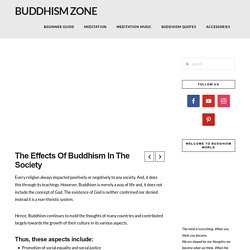
And, it does this through its teachings. However, Buddhism is merely a way of life and, it does not include the concept of God. The existence of God is neither confirmed nor denied instead it is a non-theistic system. Hence, Buddhism continues to mold the thoughts of many countries and contributed largely towards the growth of their culture in its various aspects. Thus, these aspects include: Promotion of social equality and social justiceThe opposition of the Caste systemCharacter BuildingImpact on Simple Religion and Traditions.Role on EducationImpact on great PersonalityInfluence in Writing and printingArt and Architectural InfluenceInfluence in CommerceDevelopment of language and LiteratureRespect for Animal life Development of University Establishment of contact between foreign countries Promotion Of Social Equality And Social Justice Social Justice. The Philosophy of The Buddha. Ten misconceptions about Buddhism.
Robert E.
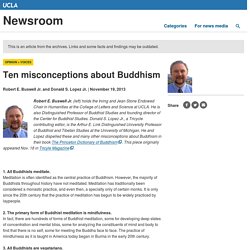
Buswell Jr. and Donald S. Lopez Jr. | November 19, 2013 Robert E. Buswell Jr. (left) holds the Irving and Jean Stone Endowed Chair in Humanities at the College of Letters and Science at UCLA. 1. Meditation is often identified as the central practice of Buddhism. 2. In fact, there are hundreds of forms of Buddhist meditation, some for developing deep states of concentration and mental bliss, some for analyzing the constituents of mind and body to find that there is no self, some for meeting the Buddha face to face. 3.
Bhikṣu, the Sanskrit term translated as "monk," literally means "beggar. " 4. It is often said that a war has never been fought in the name of Buddhism. 5. Buddhism has many philosophical schools, with a sophistication equal to that of any philosophical school that developed in Europe. 5 facts about Buddhists around the world. Buddhists across Asia are preparing to celebrate the birthday of Prince Siddhartha Gautama, who later became known as Gautama Buddha and was the founder of Buddhism.
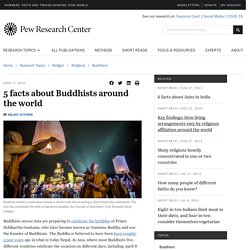
The Buddha is believed to have been born roughly 2,500 years ago in what is today Nepal. In Asia, where most Buddhists live, different countries celebrate the occasion on different days, including April 8 in Japan, May 12 in South Korea and May 18 in India and Nepal. The holiday goes by several names, including Buddha Purnima, Vesak, Buddha Jayanti and Ikh Duichen, and is often marked by national holidays, festivals and events at Buddhist temples. Here are five facts about Buddhists: Buddhists made up roughly 7% of the world’s population in 2015, but they are expected to decrease to roughly 5% by 2060. 2Half the world’s Buddhists live in China, according to 2010 Pew Research Center estimates.
What is Buddhism? Buddhism - Definition, Founder & Origins. Buddhism is a faith that was founded by Siddhartha Gautama (“the Buddha”) more than 2,500 years ago in India.
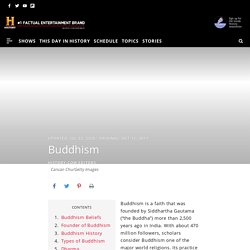
With about 470 million followers, scholars consider Buddhism one of the major world religions. Its practice has historically been most prominent in East and Southeast Asia, but its influence is growing in the West. Many Buddhist ideas and philosophies overlap with those of other faiths. Buddhism Beliefs Some key Buddhism beliefs include: Followers of Buddhism don’t acknowledge a supreme god or deity.
Founder of Buddhism Siddhartha Gautama, the founder of Buddhism who later became known as “the Buddha,” lived during the 5th century B.C. Gautama was born into a wealthy family as a prince in present-day Nepal. He decided to give up his lavish lifestyle and endure poverty. After six years of searching, Buddhists believe Gautama found enlightenment while meditating under a Bodhi tree. Buddhism History Over the next few centuries, Buddhism began to spread beyond India. Basics of Buddhism.
The Four Noble Truths The Four Noble Truths comprise the essence of Buddha's teachings, though they leave much left unexplained.
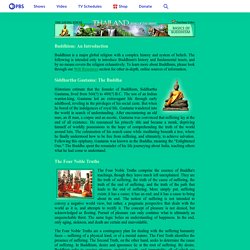
They are the truth of suffering, the truth of the cause of suffering, the truth of the end of suffering, and the truth of the path that leads to the end of suffering. More simply put, suffering exists; it has a cause; it has an end; and it has a cause to bring about its end. The notion of suffering is not intended to convey a negative world view, but rather, a pragmatic perspective that deals with the world as it is, and attempts to rectify it. The concept of pleasure is not denied, but acknowledged as fleeting. The Four Noble Truths are a contingency plan for dealing with the suffering humanity faces -- suffering of a physical kind, or of a mental nature.